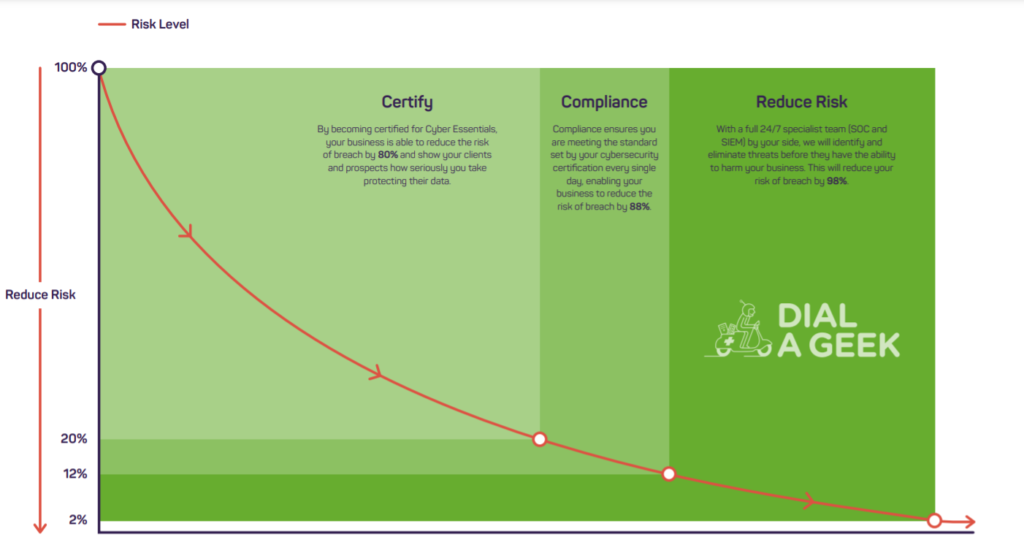Protect your Bristol business with expert cyber security services from Dial A Geek.
We help SMEs across Bristol and the South West defend their IT networks, systems and sensitive data from modern cyber threats, with friendly expert support every step of the way. Dial a Geek offers cyber security consulting based in Bristol as part of our Protect & Grow managed IT services.
Cyber attacks are becoming more targeted, more sophisticated, and more damaging. Whether you’re concerned about phishing, ransomware or compliance with GDPR, we’ll help you understand your risks and strengthen your defences.
Why Cyber Security Matters for Bristol SMEs
Professional cyber security services are an essential part of running a business in the 21st century. Many small and medium-sized businesses assume they’re too small to be targeted by cyber criminals, but the opposite can often be true. Hackers know that SMEs tend to have weaker defences, making them an easy win. And with regulations like GDPR, the stakes are higher than ever.
A cyber attack can result in:
- Data loss
- Costly downtime
- Reputation damage
- Fines for data breaches
We work with businesses across Bristol to prevent these outcomes. Whether you’re based in Clifton, Southville, Stokes Croft or further afield, we’re here to help you stay protected.
Common Cyber Threats Facing Bristol Businesses
Phishing & Business Email Compromise (BEC)
Cyber attacks like Business Email Compromise (BEC) and CEO fraud, where attackers impersonate senior executives to trick staff into transferring money, are becoming increasingly common. These are fraudulent emails that trick staff into handing over passwords, bank details or sensitive company information. One of the most common and costly forms of cyber attack, BEC targets teams by impersonating directors or suppliers.
Malware & Ransomware
Malware can enter your system via malicious email links or compromised websites. Once inside, it can steal or encrypt your data, sometimes demanding payment for its release.
Insider Threats
Whether accidental or malicious, attacks from within your business (such as disgruntled staff or careless access) can pose a significant risk to your data. This type of attack ranges from mistakes made by trying to access parts of the company network that they don’t have access to, trying to guess other users’ passwords through to intentionally doing harm or stealing company information such as client contact lists.
Social Media Breaches
The most common social media attacks on platforms such as Facebook, LinkedIn, Twitter and Instagram are used to breach users’ accounts and then discreetly obtain personal data about their colleagues and private connections. They can also be used to get access to corporate social media accounts and post false and misleading information on behalf of the company.

Our Cyber Security Services
At Dial A Geek, we offer a complete package of cyber security services tailored for small businesses. We don’t just sell tools — we help you understand what’s happening, what you need, and how to stay protected for the long term.
Our services include:
- Cyber Security Audits & Risk Assessments
- Cyber Essentials & Cyber Essentials Plus Certification
- Endpoint Detection & Response (EDR)
- Email Security: DMARC, SPF, DKIM
- Office 365 & Google Workspace Security Optimisation
- Secure Remote Access & Device Management
- Employee Awareness & Security Training
- GDPR Compliance Support
- Business Continuity & Data Backup
All services are delivered by our Bristol-based team of IT and cyber security specialists. We’re happy to offer on-site consultations, remote support, or a mix of both — whatever works best for your business.
Certification & Compliance Support
Cyber security isn’t just about protection — it’s also about proving you take it seriously. We help Bristol businesses gain trusted UK and international certifications that demonstrate best practice and build client confidence.
We can help your business with:
Cyber Essentials & Cyber Essentials Plus
UK government-backed certifications that show your business has essential cyber defences in place. We’ll guide you through the application, implementation, and audit process. Find out more about Cyber Essential Certification.
IASME Cyber Assurance
A comprehensive security standard ideal for small businesses. It includes GDPR readiness and is often used by organisations working with government contracts. Find out more about IASME Cyber Assurance.
ISO 27001 Accreditation
For businesses needing a globally recognised information security management system (ISMS), we offer consultation and practical guidance towards achieving and maintaining ISO 27001 certification.
Whether you’re applying for tenders, handling sensitive data, or simply want peace of mind, we’ll help you meet the right standards and stay compliant.
Who We Work With
Dial A Geek supports a wide range of businesses across Bristol — from growing startups in Temple Quay to long-established firms in Redland, Bedminster and beyond. With nearly 1,000 businesses relying on our managed IT and cyber support, we understand the local landscape and the unique challenges SMEs face.
Want to see how we’ve helped businesses like yours? View our case studies.

Cyber Security Q&A
Do you need Cyber Security consultancy?
Complete list of services
- Hardware Asset Management /
- IASME Cyber Assurance /
- Remote Access Device Monitoring and Management /
- Cyber Essentials /
- DMARC /
- Protect & Grow Premium /
- Protect & Grow Plus /
- Protect & Grow Standard /
- Remote IT Support Services /
- Helpdesk Support /
- Protect & Grow /
- Microsoft Teams /
- Microsoft Sharepoint /
- Apple Mac, Computer & PC Support Bristol /
- Server Support Bristol /
- IT Equipment Purchasing & Procurement Bristol /
- Cyber Security Bristol /
- Data Backup Bristol /
- Business Broadband Bristol /
- Structured Data Cabling Bristol /
- Business Wi-fi & Wireless Network Installation Bristol /
- Email Support For Small Business Bristol /
- Cloud Computing Bristol /
- Microsoft 365 /
- IT Consultancy Bristol /
- Google Workspace Support & Consultancy Bristol /
- IT Relocation & Office Moves Bristol /


